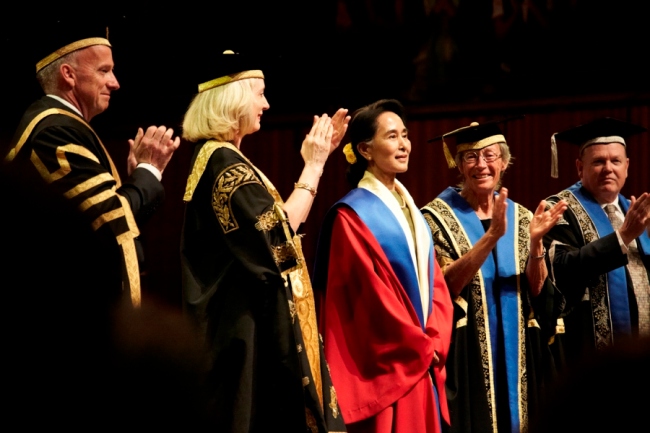Peacemakers
Recently, I had the great privilege of seeing Daw Aung San Suu Kyi receive her honorary doctorates from UTS and the University of Sydney at the Sydney Opera House. The Doctor of Letters (honoris causa) from UTS was originally awarded in 1997 while Daw Suu Kyi was under house arrest. Her address was witty, sincere and uplifting.
Photo by Louise M Cooper
There is much debate at the moment regarding whether Daw Aung San Suu Kyi has been forceful enough in her criticism of violence against ethnic minorities. Although she clearly abhors violence, she has not accepted the view of some that the violence amounts to ethnic cleansing. I don’t fully understand what is happening but her response struck a cord with me.
“I have always defended those whose human rights have been attacked, but what people want is not defence but condemnation. Particularly they are saying why am I not condemning this group or why am I not condemning that group, and it also applies to the military. Why am I not condemning the military. I don’t – I’m not condemning because I have not found that condemnation brings good results. What I want to do is to achieve national reconciliation. It’s very interesting in those days back from 1988 until a year or two ago when the military regime was very, very severe and when we talked about national reconciliation everybody agreed because they thought it was not achievable. But now when we talk about national reconciliation in very, very simple, practical terms of trying to work out our differences instead of condemning one another, then people don’t like it. So there’s an inconsistency. When they thought national reconciliation was just a pipedream they were ready to support it but now many who supported national reconciliation as a goal do not seem to be very keen on practicing national reconciliation which means as I’ve said, trying to sort out our differences without resorting to condemnation or violence.”
Nelson Mandela was also awarded a Doctor of Laws (honoris causa) by UTS in 2000. He also had to face the ruling groups and convince them to give up power peacefully so that a different kind of society could be built for all. Everyone in the rainbow nation needed to have a say in the new South Africa.
When I was 13, I had just started learning Japanese. In Social Studies, we were studying Australian history and the fact that Japanese planes bombed northern parts of Australia. I was so shocked I burst out with ‘The Japs did that!?’ without realising just how offensive that term was. The teacher corrected me and I learnt a hard lesson that slang is not harmless. I was still confused, however. How could the same people who folded origami cranes, created their words in pictures, loved dragonflys and made even a simple lunchbox a work of art cause such destruction? This was the start of my realisation that war and suffering is always complex. More than fifty years of conflict led up to Pearl Harbour and during that time a culture of abuse developed in the Japanese forces that stripped most ordinary soldiers of their humanity. The actions of Japanese soldiers during in the war can not be excused and must not be forgotten but they can be forgiven. Imagine if General Macarthur had crushed Japan instead of helping them rebuild- the cycle of poverty and conflict would never have been broken. Wars have always been spawned from previous wars and the festering sores that retribution and revenge create.
Great leaders like Aung San Suu Kyi, Nelson Mandela and UTS Alumnae Senator Sekai Holland know that they must heal their societies before they can hope for peace. Aung San Suu Kyi is fighting for democracy, but that democracy must include the military. The individuals that make up the military must have no more or no less power and rights than any other citizen. Senator Sekai Holland is governing alongside those who tortured her. Nelson Mandela worked all his life to heal South Africa. Healing is part forgiveness and part justice, with access to health and education as the key tool for balancing the scales. Now it is our turn to help heal the world. We need to be citizens of the world and make sure that our words and our actions reflect an open mind and heart. Join Rotary or apply for a Rotary Peace Fellowship and you can be part of tipping the scales. It is not just up to great leaders. We can and must find collective greatness.

Recent Comments